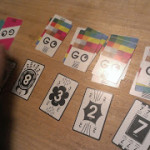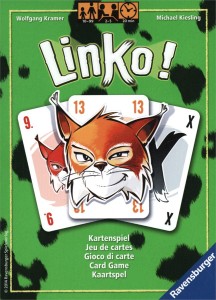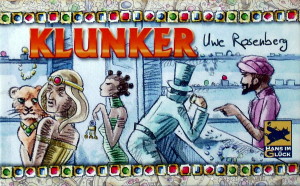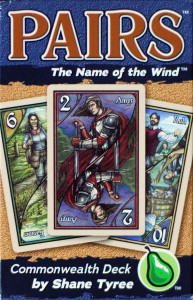- Learning time
- 10 minutes
- First play time
- 5 minutes
Go/Stop
Designed by: Taiju Sawada
Go/Stop is a game of second-guessing your opponents to try and win the biggest points card.
Over a number of rounds players – we feel it’s best with more rather than less – turn over five scorecards, one at a time, from a small deck numerically valued from 1 to 10. Players play cards from their own hand (they have five Stop cards and one Go card) face down next to these points cards. Once everyone has done that the ‘bids’ on cards are revealed, one by one. Go means you didn’t want the card; Stop means you did. But if more than one player bid on the same points cards, their bids are eliminated!
As the five points cards are revealed, players return their used cards to their hand and get to play them again as a second run of cards is dealt – however, as soon as a single Stop is revealed (i.e. not tied) the reveal of new cards stops and the round is resolved by revealing all the bids and passing winners their points cards.
So it is possible to not play your Stop card at all in the first five cards and still win, but you’d be counting on nobody winning the first Points card (i.e. either no Stop bids at all or a tie) and your later bid (on the sixth or even a subsequent card) doing enough for you.
Note: at time of writing there is nowhere to buy Go / Stop online, so the Check Availability button is inactive
Joe says
I'm not 100% sold on this one, despite enjoying a lot of the microgames that are currently big in Japan. There are too many other games like this I'd rather play, like Pairs and No Thanks; but I do admire its Haiku-like minimalism and cool graphics.
The guru's verdict
-
Take That!
Take That!
None.
-
Fidget Factor!
Fidget Factor!
None. Everyone plays at the same time.
-
Brain Burn!
Brain Burn!
Low. It's a game of gambling and trying to work out your opponents decisions.
-
Again Again!
Again Again!
Though we feel it's good to have at least 4 players, Go/Stop always provides surprises.








Sam says
One round of Go/Stop can feel like the most underwhelming experience ever, especially as it can potentially be over in seconds. Only when multiple rounds are played do you really begin to make sense of the game, and it's best played - I think - with some kind of house rule in place for point-scoring.